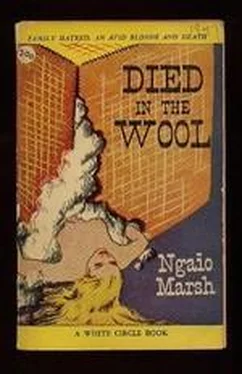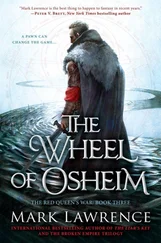Ngaio Marsh - Died in the Wool
Здесь есть возможность читать онлайн «Ngaio Marsh - Died in the Wool» — ознакомительный отрывок электронной книги совершенно бесплатно, а после прочтения отрывка купить полную версию. В некоторых случаях можно слушать аудио, скачать через торрент в формате fb2 и присутствует краткое содержание. Жанр: Классический детектив, на английском языке. Описание произведения, (предисловие) а так же отзывы посетителей доступны на портале библиотеки ЛибКат.
- Название:Died in the Wool
- Автор:
- Жанр:
- Год:неизвестен
- ISBN:нет данных
- Рейтинг книги:4 / 5. Голосов: 1
-
Избранное:Добавить в избранное
- Отзывы:
-
Ваша оценка:
- 80
- 1
- 2
- 3
- 4
- 5
Died in the Wool: краткое содержание, описание и аннотация
Предлагаем к чтению аннотацию, описание, краткое содержание или предисловие (зависит от того, что написал сам автор книги «Died in the Wool»). Если вы не нашли необходимую информацию о книге — напишите в комментариях, мы постараемся отыскать её.
Died in the Wool — читать онлайн ознакомительный отрывок
Ниже представлен текст книги, разбитый по страницам. Система сохранения места последней прочитанной страницы, позволяет с удобством читать онлайн бесплатно книгу «Died in the Wool», без необходимости каждый раз заново искать на чём Вы остановились. Поставьте закладку, и сможете в любой момент перейти на страницу, на которой закончили чтение.
Интервал:
Закладка:
“When I look out there,” Arthur Rubrick had said, “it always strikes me as being faintly comic that we should talk of ‘settling’ on the plateau and of ‘bringing in new country.’ All we do is to move over the surface of a few hills. There is nothing new about them. Primal, yes, and almost unblotted by such new things as men and sheep. Essentially back among the earlier un-human ages.” He had added that perhaps this was the reason why no one had been able to write very well about this country. It had been possible, he said, to write of the human beings moving about parasitically over the skin of the country, but the edge of modern idiom was turned when it was tried against the implacable surface of the plateau. He said that some older and therefore fresher idiom was needed, “something that has the hard edge of a spring wind in it, something comparable to the Elizabethan mode.” From this conversation was born his idea of writing about the plateau in a prose that smacked of Hakluyt’s Voyages . “It sounds affected,” said Terence, “but he only did it as a kind of game. I thought it really did give one the sensation of this country. But it was only a game.”
“A fascinating game,” said Alleyn. “What else did he write?”
Five more essays, she said, that were redrafted many times and never really completed. Very often he wasn’t up to working on them, and Flossie’s odd jobs absorbed his energy when he was well. There were many occasions when he fagged over her speeches and reports, or dragged himself to meetings and parties when he should have been resting. He had a morbid dread of admitting to his wife that he was unwell. “It’s so tiresome for her,” he used to say. “She’s too good about it, too kind.”
“And she was kind,” Ursula declared. “She took endless trouble.”
“It was the wrong kind of trouble,” Fabian said. “She oozed long-suffering patronage.”
“I didn’t think so. Nor did he.”
“Did he, Terry?” asked Fabian.
“He was extraordinarily loyal. That’s all he ever said: ‘It’s too good of her, too kind.’ But, of course it wasn’t much fun being the object of that sort of compassion. And then—” Terence paused.
“Then what, Terry?” said Fabian.
“Nothing. That’s all.”
“But it isn’t quite all, is it? Something happened, didn’t it? There was some crisis, wasn’t there? What was he worrying about that last fortnight before she died? He was worried, you know. What was it?”
“He was feeling ill. He had an idea things were going wrong in the background. Mrs. Rubrick obviously was upset. I see now that it was the trouble with Cliff Johns and Markins that had put her in a difficult mood. She didn’t tell him about Cliff and Markins, I’m sure, but she dropped dark hints about ingratitude and disappointment. She was always doing it. She kept saying that she stood alone, that other women in her position had somebody to whom they could turn and that she had nobody. He sat over there in the window, listening, with his hand shading his eyes, just taking it. I could have murdered her.”
This statement was met by a scandalized hush.
“A commonplace exaggeration,” said Fabian at last. “I’ve used it repeatedly myself in speaking of Flossie. ‘I could have murdered her.’ I suppose she got home with her cracks at Uncle Arthur, didn’t she? Every time a coconut?”
“Yes,” said Terence. “She got home.”
A longer silence followed. Alleyn felt certain that Terence had reached a point in her story where something was to be withheld from her listeners. The suggestion of antagonism, never long absent from her manner, now deepened. She set her lips and, after a quick look into the shadow where he sat, took up her work again with an air of finality.
“Funny,” said Fabian suddenly. “I thought she seemed to be rather come-hither-ish with Uncle Arthur during that last week. There was a hint of skittishness which I found extremely awe-inspring. And, I may say, extremely unusual. You must have noticed it, all of you. What was she up to?”
“Honestly, Fabian darling,” said Ursula, “you are too difficult. At one moment you find fault with Aunt Floss for neglecting Uncle Arthur and at the next you complain because she was nice to him. What should she have done, poor darling, to please you and Terry?”
“How old was she?” Douglas blurted out. “Forty-seven, wasn’t it? Well, I mean to say she was jolly spry for her age, wasn’t she? I mean to say… well, I mean, there it was… I suppose…”
“Let it pass, Douglas,” Fabian said kindly. “We know what you mean. But I can’t think that Florence’s sudden access of playfulness was entirely due to natural or even pathological causes. There seemed to me to be a distinct suggestion of proprietary rights. What I have I hold. The bitch, if you will excuse the usage, Douglas, in the marital manger.”
“It’s entirely inexcusable,” said Ursula, “and so are you, Fab.”
“I don’t mean to show off and be tiresome, darling, I promise you I don’t. You can’t deny that she was different during that last week. As sour as a lemon with all of us and suddenly so, so keen on Uncle Arthur. She watched him too. Indeed she looked at him as if he was some objet d’art that she’d forgotten she possessed until someone else came along and saw that it was — well, rare, and in its way rather beautiful. Wasn’t it like that, Terry?”
“I don’t know. I thought she was horrible, baiting him about his illness. That’s what it amounted to and that’s what I saw.”
“But don’t you agree,” Fabian persisted, “that along with that there was a definite — what shall I call it? — why damn it, she made advances. She was kittenish. She shook her curls and did the little-devil number. Didn’t she, now?”
“I didn’t watch her antics,” said Terence coldly.
“But you did, Terry. You watched. Listen to me, Terry,” said Fabian very earnestly, “don’t get it into your head that I’m an enemy. I’m not. I’m sorry for you and I realize now that I’ve misjudged you. You see I thought you were merely doing your line of oomph with Uncle Arthur out of boredom. I thought you just sat round being a cryptic woman at him to keep your hand in. I know this sounds insufferable but he was so very much older and, well, as I thought, so definitely not your cup of tea. It was perfectly obvious that he was losing his heart to you and I resented what I imagined was merely a bit of practice technique on your part. I don’t suppose you give two tuppenny damns for what I thought, Terry, but I am sorry. All right. Now, when I suggested that we should ask Mr. Alleyn to come, we all agreed that rather than carry on as we were, with this unspeakable business festering in our minds, we would, each of us, risk becoming an object of suspicion. We agreed that none of us suspected any of the other three and, even with the terrifying example of the local detective force to daunt us, we said we didn’t believe that the truth, the whole truth, although it might be unpalatable, could do us any harm. Were we right in that, Mr. Alleyn?”
Alleyn stirred a little in his armchair and joined his long fingers. “It’s a truism to say that if the whole facts of a case are known there can be no miscarriage of justice. It’s very seldom indeed, in homicide investigations, that the police arrive at the whole truth. Sometimes they get enough of the truth to enable them to build up a case and make an arrest. Most often they get a smattering of essential facts, a plethora of inessential facts and a maddening accumulation of lies. If you really do stick to your original plan of thrashing out the whole story here to-night, in this room, you will, I think, bring off a remarkable, indeed a unique performance.”
Читать дальшеИнтервал:
Закладка:
Похожие книги на «Died in the Wool»
Представляем Вашему вниманию похожие книги на «Died in the Wool» списком для выбора. Мы отобрали схожую по названию и смыслу литературу в надежде предоставить читателям больше вариантов отыскать новые, интересные, ещё непрочитанные произведения.
Обсуждение, отзывы о книге «Died in the Wool» и просто собственные мнения читателей. Оставьте ваши комментарии, напишите, что Вы думаете о произведении, его смысле или главных героях. Укажите что конкретно понравилось, а что нет, и почему Вы так считаете.










